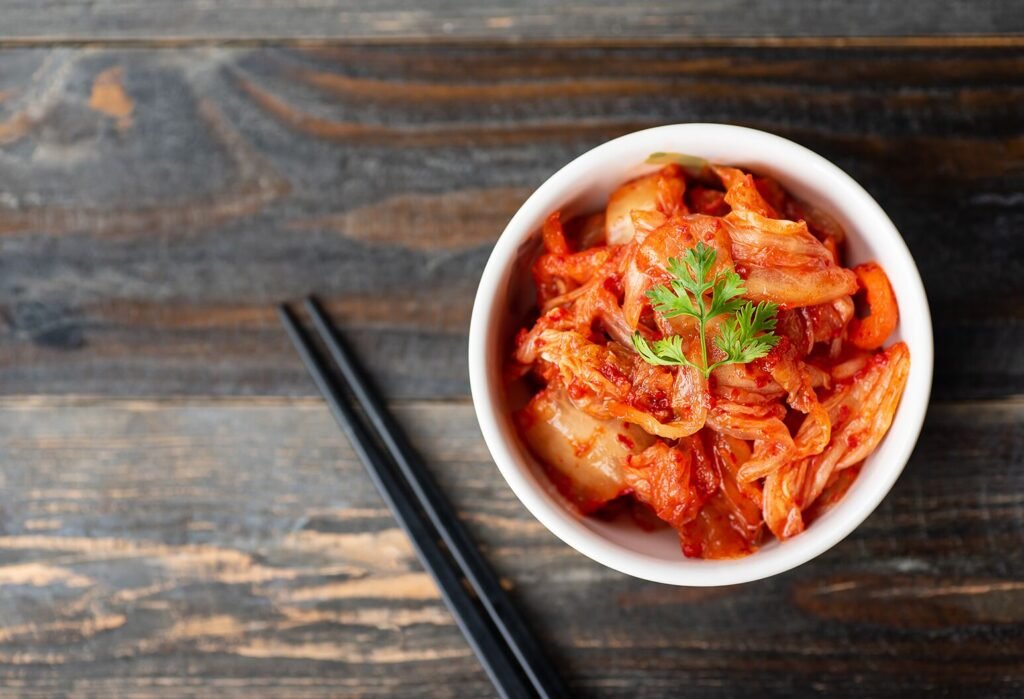In this blog we discuss the health benefits of kimchi. This traditional Korean condiment, including carrot, radish, and onion, is made from fermented cabbage with various spices. The best way to characterize the flavor is as sour and spicy, albeit it varies according to the ingredients and preparation method.
To make kimchi, chop veggies into strips or slices, rub them with salt to make a brine, add spices, then put the mixture tightly in a jar and let it ferment at room temperature for at least a week, but usually more. For best results, go for the unpasteurized versions.
Why Consuming Kimchi Is Good

1. Supports Gut Health
Growing research suggests that consuming fermented foods, such as kimchi, may significantly increase the number of beneficial bacteria in the gut, which could have positive health benefits. The fermentation process encourages the growth of probiotics—live microorganisms that can help balance the gut microbiome.
This balance is crucial for proper digestion, and a healthy gut microbiome may alleviate common digestive issues, including constipation, bloating, and irregular bowel movements. Beyond improving digestion, regularly consuming a variety of fermented foods can provide numerous other health benefits.
Additionally, fermented foods are often rich in antioxidants, which may help reduce inflammation in the body. This combined effect of improved gut health, enhanced immune function, and anti-inflammatory responses could lead to better overall well-being.
2. Enhances Nutritional Value
The fermentation process, primarily driven by Lactobacillus bacteria, can significantly enhance the nutritional value of fermented foods. During fermentation, the bacteria break down complex compounds, making the nutrients in the food more bioavailable and easier for the body to absorb.
One of the surprising benefits of kimchi is the deactivation of anti-nutrients, which are naturally occurring substances in food that can interfere with the absorption of essential nutrients. These include compounds like phytic acid, which can bind to minerals such as iron and zinc, reducing their bioavailability. By breaking down these anti-nutrients, fermentation helps ensure that vital minerals & vitamins are more accessible.
Moreover, the lactobacillus bacteria themselves produce various vitamins, including vitamins like B12 and folate, as well as other essential nutrients, enhancing the overall nutritional profile of the food. This makes fermented foods not only more digestible but also a richer source of nutrients, supporting overall health.
3. Improves Digestive Health
Probiotics, the beneficial bacteria found in fermented foods like kimchi, may contribute to better heart health by lowering inflammation and reducing cholesterol levels. Chronic inflammation and high cholesterol are two major risk factors for cardiovascular disease, and probiotics can help combat both.
By promoting a balanced gut microbiome, probiotics can reduce the production of inflammatory markers in the body, which in turn may lower the risk of heart disease. In addition to the benefits of probiotics, kimchi contains other heart-healthy components, including fiber, antioxidants, and minerals.
The fiber in kimchi helps regulate cholesterol levels by binding to excess cholesterol in the digestive tract and aiding in its removal from the body. Antioxidants, such as those found in the vegetables used to make kimchi, help fight oxidative stress, which can contribute to the development of heart disease.
Together, these compounds work synergistically to support overall heart health and reduce the risk of cardiovascular issues. It is one of the best health benefits of kimchi.
4. Supports Immune System
Preliminary research suggests that kimchi may offer significant benefits for immune health. The probiotics present in kimchi, primarily from lactic acid bacteria, play a crucial role in boosting the body’s immune response.
Furthermore, kimchi is rich in vitamin C, a powerful antioxidant that is well-known for its ability to strengthen the immune system. Vitamin C supports various immune functions, including the production of white blood cells, which are essential for combating harmful pathogens.
Combined with the anti-inflammatory effects of probiotics, the vitamin C content in kimchi provides a double benefit, potentially improving the body’s ability to defend itself against illness and promoting overall immune health.
5. Support Heart Health
Fermentation-causing bacteria in kimchi produce biologically active peptides, such as conjugated linoleic acids (CLA), which have been linked to various health benefits of kimchi, including the potential to reduce blood pressure. These effects contribute to better cardiovascular health, reducing the strain on the heart and the risk of heart disease.
In addition to the benefits of CLA, kimchi contains other compounds that appear to protect blood vessels from the harmful effects of atherosclerosis. Atherosclerosis is the buildup of plaque in the arteries, which can lead to restricted blood flow and increase the risk of heart attack or stroke.
Some studies suggest that the antioxidants, fiber, and anti-inflammatory agents in kimchi help prevent the accumulation of plaque and protect the inner walls of blood vessels, promoting long-term cardiovascular health and reducing the likelihood of artery damage.
6. Helps Blood Sugar Management
Consuming it may have vast, surprising benefits of kimchi on blood sugar regulation, though the precise mechanisms behind this are not fully understood, and more research is needed to explore this relationship in greater detail.
Some studies suggest that the probiotics and bioactive compounds found in fermented kimchi could play a role in improving insulin sensitivity, which is essential for maintaining balanced blood sugar levels. Fermented foods like kimchi are rich in beneficial bacteria that may positively influence the gut microbiome, which in turn can impact how the body processes and utilizes glucose.
Furthermore, kimchi contains high levels of fiber, which can slow the absorption of sugar into the bloodstream, preventing sudden spikes in blood sugar after meals. Additionally, the antioxidants found in kimchi may help reduce inflammation, a common factor in insulin resistance and poor blood sugar control.
7. Support A Healthy Weight
Studies suggest that incorporating fermented kimchi into the diet may lead to improvements in several metabolic parameters, including body weight, body mass index (BMI), and waist-to-hip ratio. Kimchi, as a fermented food, is rich in probiotics and bioactive compounds that can have a positive impact on metabolic health.
The probiotics present in kimchi may help regulate gut microbiota, which plays a crucial role in digestion, nutrient absorption, and fat metabolism. This, in turn, could contribute to better weight management and a reduction in excess body fat.
Moreover, the fiber content in kimchi can aid in promoting feelings of fullness, potentially reducing overall calorie intake and supporting weight loss. The combination of these factors may also lead to a healthier BMI and an improved waist-to-hip ratio, both of which are important indicators of overall metabolic health and a lower risk of chronic conditions such as obesity, heart disease, and type 2 diabetes.
8. May Slow Aging
Chronic inflammation is not only associated with a wide range of diseases but is also known to accelerate the aging process. This constant inflammation can damage cells, tissues, and organs over time, contributing to the development of age-related conditions such as cardiovascular disease, diabetes, and neurodegenerative disorders.
Interestingly, research suggests that kimchi, a fermented food, may help mitigate this process and promote cell longevity. In a test-tube study, human cells treated with kimchi showed a longer lifespan and improved viability, indicating better overall cell health.
This suggests that the compounds found in kimchi, such as antioxidants and probiotics, may have protective effects against the cellular damage caused by inflammation, potentially slowing down the aging process. However, it is important to note that while these initial findings are promising, there is still a lack of extensive research.
9. Suppresses Inflammation
Fermented kimchi contains active ingredients that may help reduce inflammation, offering a wide range of potential health benefits. The probiotics found in kimchi, along with its rich array of bioactive compounds, may help mitigate this inflammation by supporting a healthy gut microbiome. A balanced gut microbiome is crucial for maintaining proper immune function and reducing systemic inflammation.
One of the notable benefits of reducing inflammation is its positive effect on vascular health; by lowering inflammation in the blood vessels, kimchi may help improve circulation and reduce the risk of heart disease. Additionally, kimchi’s antioxidants, along with its anti-inflammatory properties, may also support brain health, potentially enhancing memory and cognitive function.
Is There Anything Negative About Kimchi?
Foodborne illness is one of the primary safety concerns associated with kimchi consumption. Despite being a fermented food, which is typically less prone to contamination, kimchi has been linked to outbreaks of norovirus and Escherichia coli (E coli). This is because, although the fermentation process generally promotes a healthy environment for beneficial bacteria, certain pathogens can still survive and proliferate under certain conditions.
The ingredients in kimchi, such as raw vegetables and seafood, along with the ability of viruses to adapt, make it susceptible to contamination. As a result, people with weakened immune systems, such as the elderly, pregnant women, or individuals with chronic health conditions, should exercise caution when consuming kimchi.
Another consideration is the amount of histamine in kimchi, which can vary depending on the type and production method. Histamine is a naturally occurring compound that, in high levels, can cause allergic reactions or other adverse effects.
Lastly, a study conducted on more than 100 individuals with high blood pressure found no significant correlation between kimchi consumption and elevated blood pressure, despite concerns over the dish’s high salt content. This suggests that while salt content is an important consideration, kimchi may not have as much of an impact on blood pressure as some might fear, though moderation remains key.
FAQ
Q: Why is kimchi considered a superfood?
A: A fermented vegetable dish called kimchi may give your meals a sour, spicy bite. It may have a lot of salt, but it also contains fiber, vitamins, minerals, antioxidants, and beneficial bacteria that help your body fight off disease and remain healthy.
Q: What is the safe daily intake of kimchi?
A: Consuming up to three dishes of kimchi per day may lower the risk of obesity in males. Additionally, recent research found that eating radish kimchi is linked to a decreased incidence of abdominal obesity in both men and women.
Q: Does kimchi include a lot of antioxidants?
A: Chinese cabbage, radishes, onions, red pepper powder, garlic, ginger, and fermented jeotgal are the ingredients of kimchi, a classic Korean fermented meal. Natural antioxidants, including carotenoids, vitamins, flavonoids, and other phenolic compounds, may be found in kimchi.











